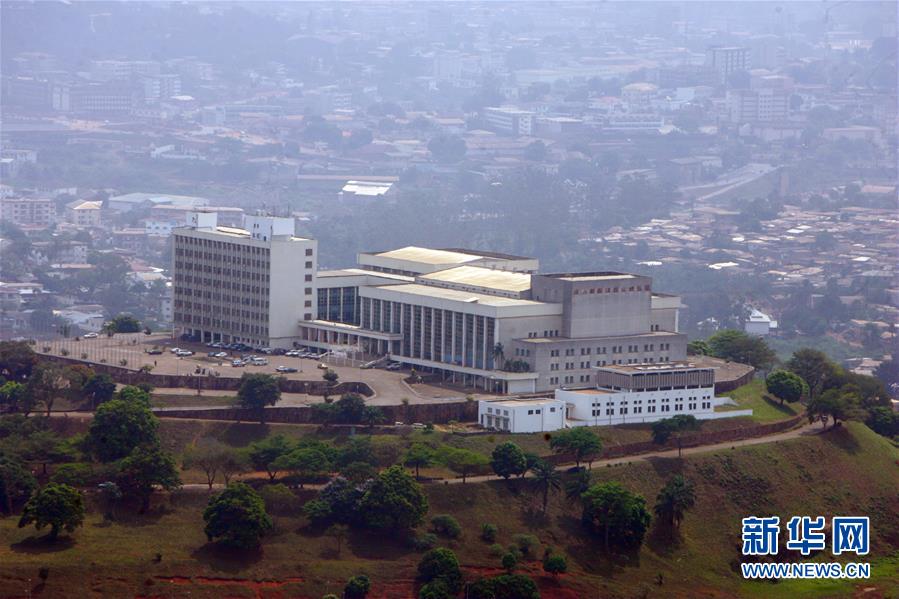Editor’s note: On May 8, 2019, Ambassador Wang Yingwu of China published an article in the Cameroon Tribune, the text of which is as follows:
From April 25 to 27, 2019, the second "Belt and Road" Forum for International Cooperation was held in Beijing. The forum is under the theme "Building ‘the Belt and the Road’ for a better future". The forum includes the opening ceremony, a round table of leaders, high-level meetings, 12 thematic sub-forums, and a conference of entrepreneurs. Chinese President Xi Jinping, Heads of State and Government from 37 other countries, the UN Secretary-General, the Executive Director of the International Monetary Fund, and more than 6,000 participants from 150 countries and 92 international organizations participated at this forum.

The Yaounde Conference Center, covering an area of 30,797 kilometers, was constructed from March 1978 to October 1981 under the aid of Chinese government. (Photo: Xinhua)
In a world where economic growth is slowing down, protectionism and unilateralism are gaining ground, the forum advocates the construction of an open global economy, and takes out the widely shared consensus, which is to develop high quality joint construction of "The Belt and the Road".
President Xi Jinping emphasized in his keynote speech that the joint construction of the "Belt and the Road" should pursue the principles of "dialogue, synergy and sharing" and adhere to the concepts of openness, green development and integrity, and achieve the goals of standards, population well-being and sustainable development. The joint building of the "Belt and the Road" emphasizes connectivity, which requires building a global connectivity partnership for shared development and shared prosperity. Infrastructure is the cornerstone of connectivity, which is why we need to build sustainable, resilient, inclusive, accessible, high-quality infrastructure at a reasonable cost. We need to promote trade and investment liberalization and facilitation, strongly oppose protectionism and advance economic globalization in a more open, inclusive, balanced and beneficial way for all. We must seize the opportunities generated by digital, intelligent and networked development, look for new drivers of growth and development approaches. International cooperation for development must be strengthened to create more opportunities for developing countries and help them to eradicate poverty and achieve sustainable development. We must work to promote mutual inspiration and enrichment among civilizations to create a multidimensional dynamic of human and cultural exchanges.
President Xi's speech evoked sympathy among all participants. Thus, all the leaders jointly expressed a clear attitude against protectionism and unilateralism and reached a political consensus to vigorously promote interconnections, highlight the dynamics of economic growth and promote sustainable development. All parties believe that for a high-quality joint construction of the "Belt and Road", there is a need to focus on deeper pragmatic cooperation, more open interconnected development and wider mutual benefit. It must focus on building quality infrastructure and industrial cooperation, and resolving key issues such as financial support, investment environment, risk management and control, and mutual understanding of people. There is also a need to establish a working mechanism and improve accompanying measures in order to achieve more visible results.
The Silk Road Economic Belt Initiative and the 21st Century Maritime Silk Road Initiative is a cooperation initiative launched by President Xi Jinping in 2013, and is also an important constitutive element of the Silk Road Belt. Xi Jinping's thought on diplomacy. To date, 127 countries including Cameroon and 29 international organizations have already signed cooperation documents under the "Belt and Road" initiative with China. At the same time, the measures and concepts of cooperation of the "Belt and Road" initiative have been included in documents of major international institutions, including the United Nations, the Group of Twenty, APEC and the United Nations. Shanghai Cooperation Organization.
The joint construction of "Belt and Road" will continue the spirit of mutual respect, peer-to-peer consultation, openness and win-win. It will actively strengthen the synergy of the development strategies of the United Nations and partner countries, to achieve common development and share with more people the fruits of the "Belt and the Road". China will deepen reform and openness, and work with partners to continually promote the development of high-quality joint construction of the "Belt and Road".
China and Cameroon are good brothers, good friends and good partners. Our two countries have already conducted a series of cooperation projects under the "Belt and Road", such as ports, highways, hydroelectric power stations, power transmission lines, fiber optic backbone extension, factories drinking water in cities, boreholes in rural areas, social housing, education and health, etc., which makes a favorable contribution to the development of Cameroon and the improvement of living conditions of Cameroonians. China intends to work together with Cameroon, implementing the consensus reached at the forum to foster the global connectivity partnership, and the 8 major initiatives of the Beijing Summit of the Forum on China-Africa Cooperation, to be strengthened by all the plans friendship cooperation between our two countries to give more contribution to the realization of the emergence of Cameroon.


